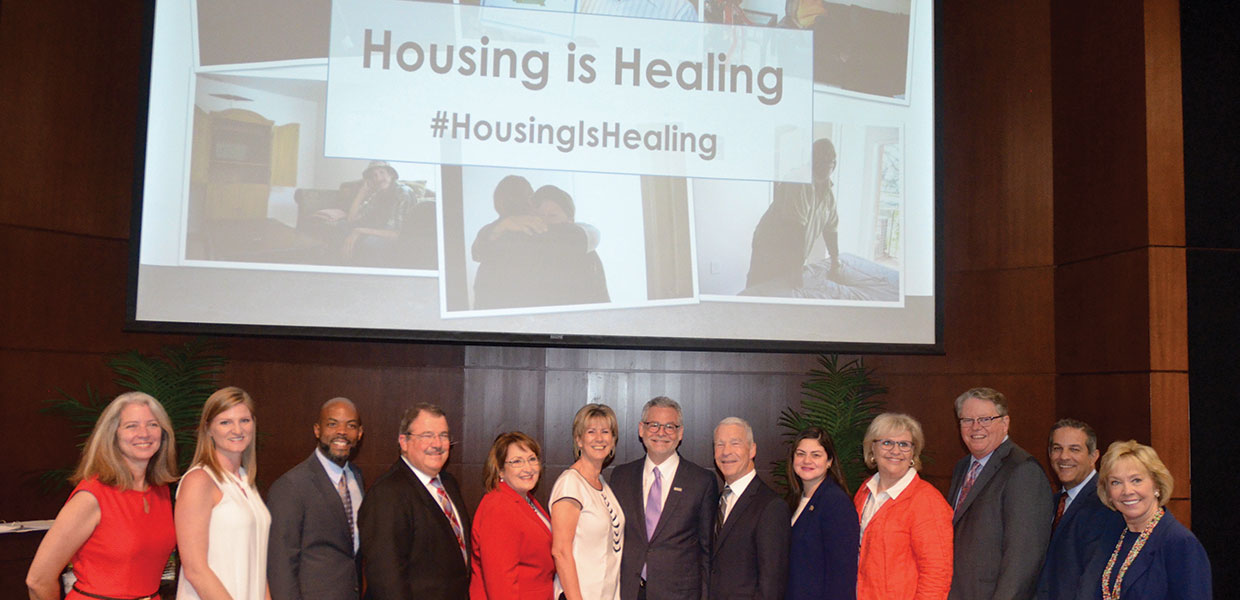
Executives with the Central Florida Commission on Homelessness and Adventist Health System’s Florida Hospital joined Buddy Dyer, Orlando mayor; Teresa Jacobs, Orange County mayor; Jose Alvarez, Kissimmee mayor; Peggy Choudhry, Osceola County commissioner; and John Horan, Seminole County commissioner, to announce more than 100 formerly homeless people have moved into homes as a result of the region’s “Housing First” initiative.
In 2014, Florida Hospital made a $6 million donation to end chronic homelessness in central Florida — the largest one-time private commitment of its kind. Central Florida leaders leveraged this contribution to launch a campaign to end the cycle of chronic homelessness in the region by transitioning to the Housing-First model, in which the chronically homeless are provided a home, extensive support services, and case managers.
“We are thrilled to celebrate this significant milestone in central Florida’s history. This pilot to build a new system of care would not be possible were it not for the collaboration and support of our community partners in the tri-county area,” said Shelley Lauten, CEO of the Central Florida Commission on Homelessness. “While the pilot shows great promise, it is important we remember the work we have done as a community must not stop. We will continue to work together to effectively end chronic homelessness in central Florida — by making it rare, brief, and one-time.”
The Housing First model is a proven approach that seeks to end the vicious cycle of chronic homelessness that costs communities, local governments, hospitals, and businesses millions of dollars each year.
When Florida Hospital joined the initiative with its donation, the organization identified 100 homeless central Floridians who most frequently visited the Emergency Department during a one-year period. In that time, their combined total hospital charges were nearly $15 million in uncompensated care.
“Every day, hundreds of people enter our emergency rooms. We provide life-saving surgeries, treat their infections, and try to heal them. But, if a patient is homeless and has no social, financial, mental, or medical support, they return to our hospitals time and time again,” Daryl Tol, president and CEO of Florida Hospital and the Central Florida Region – Adventist Health System. “While there is a cost benefit to ending chronic homeless, as a faith-based organization, it’s what we are called to do. We believe housing is healing.”
Leaders with the Central Florida Commission on Homelessness, Homeless Services Network, and other community partners shared several results of this pilot project, including the following:
- 168 people housed since September 2015.
- 73 additional people receiving case management and waiting for a home.
- More than $4 million spent so far for the Housing First program: $2.5 million for case management, and $1.2 million for housing.
- Additionally, Florida Hospital reports a nearly 60 percent reduction in Emergency Department visits by the formerly homeless involved in the pilot program who have been housed one year or more.
“Our region’s effort to house our homeless population is another example of the power of collaboration. Florida Hospital’s commitment to ending chronic homelessness was a catalyst for developing a coordinated, long-term solution to address one of our region’s most complex challenges,” said Buddy Dyer, Orlando mayor. “I am proud that, as a result of this partnership, our community has surpassed our initial goal under the Housing First model.”
Significant strides have been made outside the Florida Hospital-related funding, too. During the same time, more than 580 additional chronically homeless central Floridians were housed as a result of the regional Housing First efforts.
“While much has been accomplished, an immense need remains,” said Martha Are, executive director of the Homeless Services Network of Central Florida. “We know there are at least 1,000 more chronically homeless men and women in central Florida who need our help with housing.”
For the formerly homeless such as Ann Anderson, a house and the key services are literally life-changing.
“Having a home is a huge blessing,” said Anderson, who lived in a tent behind a business in Orange County. Anderson said she appreciates the simple things, like being able to get a glass of cold water to drink.
Elected officials who have been supportive of the Housing First initiative applauded the efforts and results the region is experiencing so far.
“As a region, we have a proven track record of success through collaboration. On issues that range from affordable housing to the intensely complex issue of homelessness, we’re more effective when working as a region,” said Teresa Jacobs, Orange County mayor. “Through an interdisciplinary approach that includes not just the jurisdictions, but also our health care, housing, social services, and mental health professionals, we’ve been able to align priorities in support of ‘Housing the First 100’ program. Through the Homeless Services Network, and in partnership with Florida Hospital, we’ve been able to make real progress in housing a very vulnerable group of high-need, chronically homeless individuals.”
Adventist Health System | August 2017



Comments are closed.